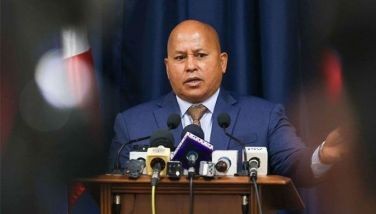5-year ban on pilots’ foreign hiring eyed
March 2, 2006 | 12:00am
Various representatives of the local aviation industry are pushing for the imposition of a three to five-year moratorium on the recruitment and deployment of Filipino pilots abroad, saying the exodus of Filipino pilots threatens the viability of the industry.
They made this appeal Tuesday when the labor and employment committee of the House of Representatives headed by Zamboanga del Norte Rep. Roseller Barinaga conducted a public hearing on the "ongoing brain drain" in the aviation industry.
Representatives of flag carrier Philippine Airlines (PAL), Air Philippines, Cebu Pacific, Lufthansa-Teknik and Aviation Partnership said government action is needed to thwart the exodus of the country’s trained pilots, who have been taking higher-paying jobs with foreign carriers over the last few years.
"All of us are suffering from deep bleeding in manpower. We are losing our pilots and aircraft mechanics faster than we can produce. Even trainers and instructors are now being pirated," Ed Medina of PAL said.
Barinaga earlier urged the government to make a decisive move on the matter because there is a need to "re-examine" the Migrant Workers Act of 1995, or Republic Act 8042, in "pursuit of national interest" or "when the public welfare so requires."
In a privilege speech, Barinaga said measures are needed so the country will not lose its pilots, aircraft personnel, information technology (IT) engineers and electronic technicians to foreign governments that have openly recruited Filipino experts in these fields.
"There is no way for this country to progress except to strengthen our own foothold," he said. "While we need to be forward-looking, we also ought to be inwardly interested. Our intellectual heritage and skills are urgently needed for the progress of this nation."
He said the "the looming crisis must be readily met and we should protect and ensure the survival of our own aviation industry and the other (affected) industries."
The country faces shortages of pilots, doctors, engineers, teachers, health industry workers and other professionals whose work is essential to the country’s growth because these professionals seek greener pastures and better pay in other countries.
"Let us keep what we have, enrich this nation with brilliance, talents and skills because our country deserves the best," he said. "Unless we have so much richness to make us live for a lifetime, let us not give."
To buttress his statements, Barinaga cited figures from the Philippine Overseas Employment Administration (POEA), which he described as "alarming." He called on the departments of foreign affairs and labor to review the Migrant Workers Act of 1995.
Government records show that, from 2000 to 2005, some 1,159 aircraft mechanics and technicians left the country, on top of the number of airline support crew personnel directly hired by foreign employers who, in effect, "evaded the POEA count."
"An airline reported that some 140 pilots left their employ during the same period," he said. "This should ring alarm bells since the Air Transportation Office (ATO) reveals there are only 700 commercial pilots actively employed by the industry."
Based on job orders, Barinaga said Singapore needs 767 aircraft mechanics and 50 junior aircraft mechanics, Saudi Arabia needs 73, Hong Kong and Qatar did not specify the number of airline support crew they need, China will need 10,000 pilots in the next 20 years, India needs 3,500 pilots by 2010.
He also observed that aviation schools in the country actually lose more skilled workers than they produce: "This deals a heavy blow to our domestic aviation industry."
"What aggravates the whole distressing situation is that the current capacity of our schools offering aviation-related courses is so low that we are losing our aviation people faster than we can replenish them," Barinaga said.
The government should not be overwhelmed by the remittances sent home by overseas Filipino workers (OFWs), who have kept the Philippine economy afloat, he added.
At the end of the day, he said, it is the Philippines that loses because of the brain drain: "The immediate windfall from the remittances makes it so easy to gloss over the reality that the diaspora of our skilled labor exacts a painful toll on the basic industries that should form the building block of a strong Philippine economy."
Barinaga added that, if left unchecked, the brain drain "will cripple not only the aviation industry but also topple the pillars of national economy."
In the past five years, he noted that the "poaching practices" of foreign governments in hiring skilled Filipinos for foreign deployment has "become a cottage industry."
They made this appeal Tuesday when the labor and employment committee of the House of Representatives headed by Zamboanga del Norte Rep. Roseller Barinaga conducted a public hearing on the "ongoing brain drain" in the aviation industry.
Representatives of flag carrier Philippine Airlines (PAL), Air Philippines, Cebu Pacific, Lufthansa-Teknik and Aviation Partnership said government action is needed to thwart the exodus of the country’s trained pilots, who have been taking higher-paying jobs with foreign carriers over the last few years.
"All of us are suffering from deep bleeding in manpower. We are losing our pilots and aircraft mechanics faster than we can produce. Even trainers and instructors are now being pirated," Ed Medina of PAL said.
Barinaga earlier urged the government to make a decisive move on the matter because there is a need to "re-examine" the Migrant Workers Act of 1995, or Republic Act 8042, in "pursuit of national interest" or "when the public welfare so requires."
In a privilege speech, Barinaga said measures are needed so the country will not lose its pilots, aircraft personnel, information technology (IT) engineers and electronic technicians to foreign governments that have openly recruited Filipino experts in these fields.
"There is no way for this country to progress except to strengthen our own foothold," he said. "While we need to be forward-looking, we also ought to be inwardly interested. Our intellectual heritage and skills are urgently needed for the progress of this nation."
He said the "the looming crisis must be readily met and we should protect and ensure the survival of our own aviation industry and the other (affected) industries."
The country faces shortages of pilots, doctors, engineers, teachers, health industry workers and other professionals whose work is essential to the country’s growth because these professionals seek greener pastures and better pay in other countries.
"Let us keep what we have, enrich this nation with brilliance, talents and skills because our country deserves the best," he said. "Unless we have so much richness to make us live for a lifetime, let us not give."
To buttress his statements, Barinaga cited figures from the Philippine Overseas Employment Administration (POEA), which he described as "alarming." He called on the departments of foreign affairs and labor to review the Migrant Workers Act of 1995.
Government records show that, from 2000 to 2005, some 1,159 aircraft mechanics and technicians left the country, on top of the number of airline support crew personnel directly hired by foreign employers who, in effect, "evaded the POEA count."
"An airline reported that some 140 pilots left their employ during the same period," he said. "This should ring alarm bells since the Air Transportation Office (ATO) reveals there are only 700 commercial pilots actively employed by the industry."
Based on job orders, Barinaga said Singapore needs 767 aircraft mechanics and 50 junior aircraft mechanics, Saudi Arabia needs 73, Hong Kong and Qatar did not specify the number of airline support crew they need, China will need 10,000 pilots in the next 20 years, India needs 3,500 pilots by 2010.
He also observed that aviation schools in the country actually lose more skilled workers than they produce: "This deals a heavy blow to our domestic aviation industry."
"What aggravates the whole distressing situation is that the current capacity of our schools offering aviation-related courses is so low that we are losing our aviation people faster than we can replenish them," Barinaga said.
The government should not be overwhelmed by the remittances sent home by overseas Filipino workers (OFWs), who have kept the Philippine economy afloat, he added.
At the end of the day, he said, it is the Philippines that loses because of the brain drain: "The immediate windfall from the remittances makes it so easy to gloss over the reality that the diaspora of our skilled labor exacts a painful toll on the basic industries that should form the building block of a strong Philippine economy."
Barinaga added that, if left unchecked, the brain drain "will cripple not only the aviation industry but also topple the pillars of national economy."
In the past five years, he noted that the "poaching practices" of foreign governments in hiring skilled Filipinos for foreign deployment has "become a cottage industry."
BrandSpace Articles
<
>
- Latest
- Trending
Trending
Latest
Trending
Latest
Recommended


































